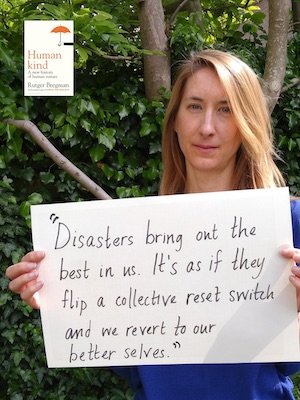By Laela Zaidi
Philosophers, faith leaders, and scientists throughout the ages have propagated a largely negative view of humanity. This sentiment was especially canonized in the 17th and 18th-centuries when Enlightenment philosophers like Thomas Hobbes asserted that humans are selfish, power-hungry, and individualistic. The Dutch historian Ruger Bregman challenges this perspective in his book Humankind: A Hopeful History (2020), where he argues that a Hobbesian view of humanity can be scientifically disproven. To Bregman, humans have continually shown themselves to be cooperative, collectively-minded beings.
Co-translated by Erica Moore and Elizabeth Manton (ΦBK, Syracuse University), Bregman’s ambitious yet accessible work surveys human behavior from the time we became Homo sapiens through the next 200,000 years of human history. With humor and wit, the popular historian revisits the Stanford prison experiment, a murder in New York, and a real-life Lord of the Flies scenario to evidence his claim that humans are collectivists. Bregman’s book aims to show it is not merely optimistic or aspirational to believe so; it’s a trend evidenced through numerous branches of science and research.
Moore and Manton’s English adaptation, one of more than 30 translations to hit worldwide bookshelves, was longlisted for the 2021 Andrew Carnegie Medal of Excellence in Nonfiction. Bregman’s first book in English, Utopia for Realists (2017), was also translated by Manton. In addition to his viral interview of leaders at Davos, Bregman’s visibility as a historian and public intellectual has been made possible by his wildly successful books, both of which made The New York Times Bestsellers list. Manton has been translating his works for years, both as a journalist and book writer.
Born to parents who met in the Netherlands, Manton grew up in the United States speaking Dutch. She graduated from Syracuse University with a B.A. in art history and Medieval Renaissance studies. Then, she completed her master’s in art history at the Courtauld Institute in London. Upon moving to the Netherlands, she began exploring a career in translation and attended the Vrije Universiteit Amsterdam for her M.A. in translation. She has been translating ever since.
Despite Manton’s familiarity with Bregman’s works, translating Humankind was a personal, engaging endeavor. “This is a whole different kind of text because it’s about ideals, principles, and a different way of looking at the world that I feel drawn to and can stand behind as well,” she explained. “That made it a really attractive project, and I helped to bring [these ideas] out to the world.”
The English language translation of Humankind involved many sets of eyes, including Bregman’s, thus making the process all the more intensive. “I think translating engages with the text at such a deep level that things come to the fore that maybe don’t in just a normal round of editing,” she said. “There are so many people engaging with the text at that point that it crystallizes certain things and shows what needs to be more strongly argued.”
Manton credits her liberal arts and sciences education with giving her the skills to tackle Humankind’s wide-spanning research. “I remember taking all sorts of different courses in subjects that I didn’t necessarily want to, but they really broaden your perspective,” she recalled. “With a book like this as well, Rutger draws on research in all different fields, and I think it’s very helpful honestly to have a broad background that you can contextualize all those things and it’s familiar, in a way.”
The book left a deep impression on Manton, especially during the pandemic. “Most things that you see are pretty negative,” she observed. “Because of his book and what he argues, I keep reminding myself that these are the exceptions and most people are following the rules and are trying their best . . . in general, people are nice and inclined to do the best they can. I think that’s true because otherwise we wouldn’t still be around after 300,000 years.”
Though time will tell whether Bregman’s arguments hold true, Humankind has been praised as a refreshing palate cleanser in a sea of heavy news. The book landed on The Washington Post’s notable nonfiction list in 2020, and The Guardian noted it as a “sustained and enjoyable tribute to our better natures.”
Laela Zaidi earned her Bachelor of Arts in religious studies from Hendrix College, where she was inducted into Phi Beta Kappa in May 2018. Hendrix College is home to the Beta of Arkansas chapter of Phi Beta Kappa.




